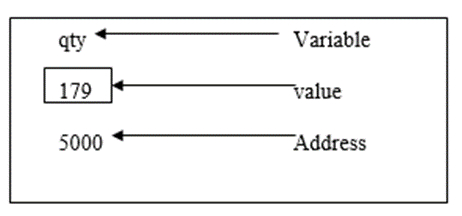
 Data Structure
Data Structure Networking
Networking RDBMS
RDBMS Operating System
Operating System Java
Java MS Excel
MS Excel iOS
iOS HTML
HTML CSS
CSS Android
Android Python
Python C Programming
C Programming C++
C++ C#
C# MongoDB
MongoDB MySQL
MySQL Javascript
Javascript PHP
PHP
- Selected Reading
- UPSC IAS Exams Notes
- Developer's Best Practices
- Questions and Answers
- Effective Resume Writing
- HR Interview Questions
- Computer Glossary
- Who is Who
How to multiply two matrices using pointers in C?
Pointer is a variable that stores the address of another variable.
Features of Pointers
- Pointer saves the memory space.
- The execution time of a pointer is faster because of the direct access to a memory location.
- With the help of pointers, the memory is accessed efficiently i.e. memory is allocated and deallocated dynamically.
- Pointers are used with data structures.
Pointer declaration, initialization and accessing
Consider the following statement −
int qty = 179;
In the memory, the variable can be represented as shown below −

Declaration
Declaring a pointer can be done as shown below −
Int *p;
It means ‘p’ is a pointer variable which holds the address of another integer variable.
Initialization
The address operator (&) is used to initialize a pointer variable.
For example,
int qty = 175; int *p; p= &qty;
Accessing a variable through its pointer
To access the value of the variable, indirection operator (*) is used.
Example
Following is the C program to multiply the two matrices by using pointers −
#include <stdio.h>
#define ROW 3
#define COL 3
/* Function declarations */
void matrixInput(int mat[][COL]);
void matrixPrint(int mat[][COL]);
void matrixMultiply(int mat1[][COL], int mat2[][COL], int res[][COL]);
int main() {
int mat1[ROW][COL];
int mat2[ROW][COL];
int product[ROW][COL];
printf("Enter elements in first matrix of size %dx%d
", ROW, COL);
matrixInput(mat1);
printf("Enter elements in second matrix of size %dx%d
", ROW, COL);
matrixInput(mat2);
matrixMultiply(mat1, mat2, product);
printf("Product of both matrices is :
");
matrixPrint(product);
return 0;
}
void matrixInput(int mat[][COL]) {
int row, col;
for (row = 0; row < ROW; row++) {
for (col = 0; col < COL; col++) {
scanf("%d", (*(mat + row) + col));
}
}
}
void matrixPrint(int mat[][COL]) {
int row, col;
for (row = 0; row < ROW; row++) {
for (col = 0; col < COL; col++) {
printf("%d ", *(*(mat + row) + col));
}
printf("
");
}
}
void matrixMultiply(int mat1[][COL], int mat2[][COL], int res[][COL]) {
int row, col, i;
int sum;
for (row = 0; row < ROW; row++) {
for (col = 0; col < COL; col++) {
sum = 0;
for (i = 0; i < COL; i++) {
sum += (*(*(mat1 + row) + i)) * (*(*(mat2 + i) + col));
}
*(*(res + row) + col) = sum;
}
}
}
Output
When the above program is executed, it produces the following output −
Enter elements in first matrix of size 3x3 2 3 1 2 5 6 2 6 8 Enter elements in second matrix of size 3x3 1 2 1 2 3 4 5 6 7 Product of both matrices is : 13 19 21 42 55 64 54 70 82

Advertisements
